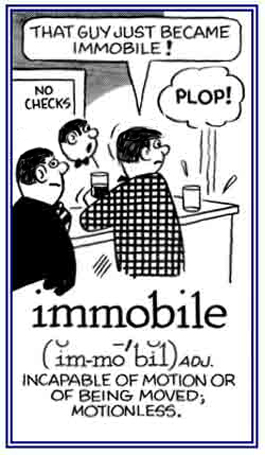mobil-, mobi-
(Latin: move, moving, to set in motion)
2. A self-moving vehicle; a motor vehicle.
3. A road vehicle, usually with four wheels and powered by an internal-combustion engine, designed to carry a small number of passengers.
2. An automobile powered by a motor supplied with electric current from a storage battery or other device; such as, a fuel cell.
Electric cars were popular between the late 1890's and 1910 and interest in them has revived with new methods of generating electrical power.
2. A drift mobility of electrons in a semiconductor which consists of the electron velocity divided by the applied electric field.
2. A characteristic of living cells in suspension (a dispersion of fine solid or liquid particles in a fluid) and biological compounds (proteins) in a solution to travel in an electric field to the positive or negative electrode, because of the charge on these substances.
Hypermobility is often misused to describe extra movements as seen in a contortionist.
2. Increased range of the movement of joints, joint laxity, occurring normally in young children or as a result of disease; such as, Marfan's syndrome (disorder of connective tissue of musculoskeletal system or abnormal length of the limbs; especially the fingers and the toes) or Ehlers-Danlos syndrome (disorder of the connective tissue; such as, joints that bend too easily into extensions).3. Excessive joint play (movement) which permits increased mobility.
The area where two bones meet is called a joint and all joints have a cavity containing a small amount of synovial fluid, which allows for movement.
The attached tendons, muscles, ligaments, and joint capsules hold the joints in their correct positions.
Looseness of these supporting structures allows a joint to have extra motion and often, even normal activities that put stress on loose joints will irritate them.
Hypermobility syndrome may include congenital hip dislocations; scoliosis (curvature of the spine); elbow, kneecap and/or shoulder dislocations; or frequent ankle or wrist sprains.
2. Concerning something which is fixed in place and unable to be moved: The baby buggy was locked into position and therefore it was immobile and couldn’t roll away!

Go to this Word A Day Revisited Index
so you can see more of Mickey Bach's cartoons.
Jim was suddenly immobilized when another driver almost ran into his car while he was driving in town.

